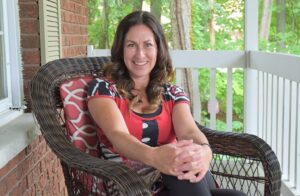Dokis First Nation Taking Care of Our Stories project continues

By Kelly Anne Smith
DOKIS FIRST NATION— “A woman is about to give birth but there is no road. The French River and Lake Nipissing are traversed to reach medical services.” Carly Dokis gives an example of a story about a pregnant Dokis First Nation woman travelling by boat to seek a doctor.
Dokis is an Associate Professor of Anthropology at Nipissing University and excited about receiving SSRHC funding for the very important work of the Taking Care of Our Stories project.
“This project is about listening to people’s stories as they talk about their lives.”
The professor’s work on Taking Care of Our Stories is in partnership with Randy Restoule of Dokis First Nation and Dokis Museum Manager Adrienne Dokis. Taking Care of Our Stories will see the building of a repository of stories, staying in the community, and be seen by future generations in the museum.
Dokis hopes to draw in more people, in particular young people, who are either interested in participating and telling stories or interested in learning about the technical components of the project.
“We are trying to not only have this project documenting and preserving stories from the community but also to engage the community youth and other community members who are interested in developing skills in research and participating in that capacity as well.”
Dokis says earlier work gave opportunities to sit with Elders.
“The researchers start at the beginning with ‘When and where were you born? What did your parents do for a living? What kinds of things did you do as a kid that were fun?’ In all the stories, we have heard so far, there is a tremendous sense of community and pride in being from Dokis. It highlights how amazing the people are that live there.”
Dokis says there are plans for shorter stories that will be an exhibit at the Dokis Museum.
“When you walk through the museum, you can touch a touch screen and listen to someone talking about how they used to harvest maple syrup. We’ll be taking video of them out doing it so we’ll have this beautiful story available at the museum. You’ll have the museum animated by the stories themselves and the people from the community sharing their lives.”
The team is also looking at producing interactive exhibits aimed at young people. That might include developing web-based applications that the students can use to learn the history of their community and to learn the language.
“The stories are so rich. I hope that for future generations, the collection of these stories is a gift that they can see people— their grandparents or even their great-grandparents— talking about some of the things that are important to them,” says Dokis. “I sit with my father-in-law Mel Dokis and he’s got these amazing stories. They are so worth sharing. I’d love to make sure my children can hear those stories in his words and see his face.”
Randy Restoule is working towards ensuring the community history is preserved and that the repatriation work continues into the community. Restoule says one of the projects of Taking Care of Our Stories involves traditional harvest methods and preparation for fish. He talked of Norm Dokis Jr. conducting interviews in the early 2000s.
“In transcribing those interviews that were on VHS tape, it became apparent of the fourteen Elders that were interviewed, seven of them had passed. With that, all of their knowledge and stories were lost as well,” recalls Restoule. “One of the main individuals was Gord Restoule. He spent his years growing up around his Elders. The knowledge that he had of their stories and their oral histories went back many years that is beyond the common knowledge.”
“It is a prime example of how quickly oral history can be lost,” points out Restoule. “Gord Restoule had a vast collection of VHS tapes. He recorded weddings and major events. Using digitization, we will be preserving all of that knowledge.”
Restoule calls Dokis First Nation fortunate to have a museum where histories will be preserved for members to access in the future to retain knowledge.
“The plan is to host a server with the video and audio recordings of individuals and interviews.”
Restoule says Dokis First Nation is very careful not to post those materials online and open to the general public.
“What we intend, is to have displays and screens at the museum. You can only access the material by being present in the [Dokis] museum. It’s not going to be on the internet.”


